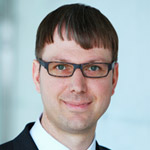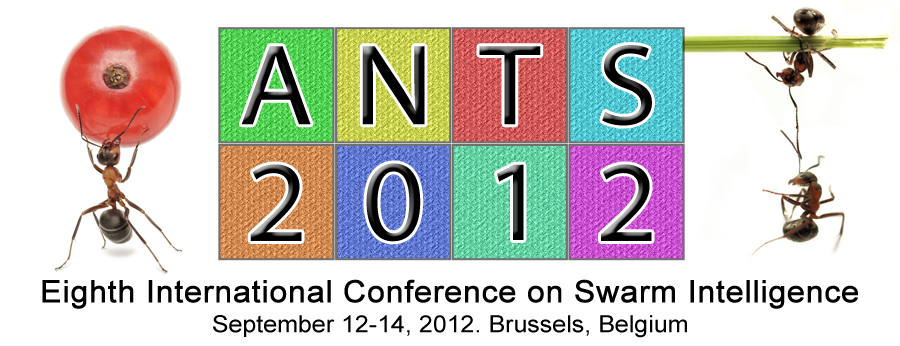ANTS 2012 Invited Talks

Ants, Bees and Brains
Wednesday, September 12, 2012Prof. Nigel R. Franks
Abstract
A complex system is one that is more than the sum of its parts. Naturally, biology is where complex systems are at their zenith. Indeed, the great evolutionary transitions, e.g. the origin of (a) chromosomes, (b) eukaryotic cells, (c) multicellular organisms and (d) animal societies, are all characterized by the collaboration or fusion of existing entities into new conglomerates. "More than the sum of its parts" might sound mysterious or even mystical. Not so: all this means is that the way the parts interact with one another generates new properties at a higher corporate level.
Understanding complex systems requires virtuous cycles of experimentation and mathematical modelling. Social insect colonies are a manifestation of the last great evolutionary transition – they are super-organisms composed of separate organisms. This means that they are ideal experimental systems for understanding complexity because they can be taken apart and put back together again and most of the key interactions among their components are macroscopic and visible. Here, I will describe experiments that show, for example, how whole social insect colonies, e.g. ants and bees, can solve problems beyond the scope of their individual members – much as brains are more sophisticated than their individual neurones.
Understanding complex systems requires virtuous cycles of experimentation and mathematical modelling. Social insect colonies are a manifestation of the last great evolutionary transition – they are super-organisms composed of separate organisms. This means that they are ideal experimental systems for understanding complexity because they can be taken apart and put back together again and most of the key interactions among their components are macroscopic and visible. Here, I will describe experiments that show, for example, how whole social insect colonies, e.g. ants and bees, can solve problems beyond the scope of their individual members – much as brains are more sophisticated than their individual neurones.
Speaker Bio
Prof. Nigel R. Franks has been studying ants professionally for more than 30 years; not just for their own sake but because these are model organisms for understanding principles that are both fundamental and general in biology and beyond. Ants facilitate studies within many fields in biology. These include communication systems, division of labour, co-operation, cognition, decision-making systems, individual and collective intelligence, and self-organization and complexity. In addition, Prof. Franks has wide interests in evolutionary and mathematical biology. Thus, he has published studies on chimpanzees, cuckoos, C. elegans and even the mathematics of leaf shape.
Nigel Franks is Professor of Animal Behaviour, School of Biological Sciences, University of Bristol. His career has included positions at Harvard University, where he worked with the eminent biologist E. O. Wilson, and at the Institute for Advanced Study in Berlin. Through his research in self-organisation he has helped to pioneer studies showing how simple rules of thumb employed by individual social insects, at a purely local level, can generate complex adaptive features at the level of the whole colony. The work of his Ant Lab, Bristol is ground-breaking as evidenced by his recent profile in Science (see http://www.sciencemag.org/content/323/5919/1284.short)
Nigel Franks is Professor of Animal Behaviour, School of Biological Sciences, University of Bristol. His career has included positions at Harvard University, where he worked with the eminent biologist E. O. Wilson, and at the Institute for Advanced Study in Berlin. Through his research in self-organisation he has helped to pioneer studies showing how simple rules of thumb employed by individual social insects, at a purely local level, can generate complex adaptive features at the level of the whole colony. The work of his Ant Lab, Bristol is ground-breaking as evidenced by his recent profile in Science (see http://www.sciencemag.org/content/323/5919/1284.short)

Architectures, abstractions, and algorithms for large teams of robots
Thursday, September 13, 2012Prof. Vijay Kumar
Abstract
Networked robots represent the convergence of robotics, sensor
networks and mobile ad-hoc networks, with many applications.
This talk will address some fundamental problems and practical
challenges underlying the deployment of large numbers of autonomously
functioning robots. The central problem is the so-called inverse
problem of deriving individual robot behaviors for a desired group
behavior. There are numerous examples of group behavior in biology at
different length scales that lend themselves to quantitative modeling
and control providing insight for the synthesis of collective
behaviors for engineered systems. I will discuss several examples and
present a methodology for modeling and analyzing such collective
behaviors with applications to teams of robots.
Speaker Bio
Vijay Kumar is the UPS Foundation Professor and the Deputy Dean for Education in the School of Engineering and Applied Science at the University of Pennsylvania. He received his Ph.D. in Mechanical Engineering from The Ohio State University in 1987. He has been on the Faculty in the Department of Mechanical Engineering and Applied Mechanics with a secondary appointment in the Department of Computer and Information Science at the University of Pennsylvania since 1987.
Dr. Kumar is a Fellow of the American Society of Mechanical Engineers (ASME) and the Institution of Electrical and Electronic Engineers (IEEE). He has served on the editorial boards of the IEEE Transactions on Robotics and Automation, Journal of Franklin Institute, IEEE Transactions on Automation Science and Engineering, ASME Journal of Mechanical Design, the ASME Journal of Mechanisms and Robotics and the Springer Stracts in Advanced Robotics (STAR). He is the recipient of the 1991 National Science Foundation Presidential Young Investigator award, the Lindback Award for Distinguished Teaching, and the 1997 Freudenstein Award for significant accomplishments in mechanisms and robotics. He has won best paper awards at DARS 2002, ICRA 2004, ICRA 2011, and RSS 2011 and has advised doctoral students who have won Best Student Paper Awards at ICRA 2008, RSS 2009, and DARS 2010. He is also a Distinguished Lecturer in the IEEE Robotics and Automation Society and an elected member of the Robotics and Automation Society Administrative Committee.
Dr. Kumar is a Fellow of the American Society of Mechanical Engineers (ASME) and the Institution of Electrical and Electronic Engineers (IEEE). He has served on the editorial boards of the IEEE Transactions on Robotics and Automation, Journal of Franklin Institute, IEEE Transactions on Automation Science and Engineering, ASME Journal of Mechanical Design, the ASME Journal of Mechanisms and Robotics and the Springer Stracts in Advanced Robotics (STAR). He is the recipient of the 1991 National Science Foundation Presidential Young Investigator award, the Lindback Award for Distinguished Teaching, and the 1997 Freudenstein Award for significant accomplishments in mechanisms and robotics. He has won best paper awards at DARS 2002, ICRA 2004, ICRA 2011, and RSS 2011 and has advised doctoral students who have won Best Student Paper Awards at ICRA 2008, RSS 2009, and DARS 2010. He is also a Distinguished Lecturer in the IEEE Robotics and Automation Society and an elected member of the Robotics and Automation Society Administrative Committee.

Towards Simulating the Foundations of Society
Friday, September 14, 2012Prof. Dirk Helbing
Abstract
In order to understand social systems, it is essential to identify the circumstances under which
individuals spontaneously start cooperating or developing shared behaviors, norms, and culture.
In this connection, it is important to study the role of social mechanisms such as repeated interactions,
group selection, network formation, costly punishment and group pressure, and how they allow to transform social
dilemmas into interactive situations that promote the social system. Furthermore, it is interesting to study
the role that social inequality, the protection of private property, or the on-going globalization play
for the resulting "character" of a social system (cooperative or not). It is well-known that social cooperation
can suddenly break down, giving rise to poverty or conflict. The decline of high cultures and the outbreak of civil
wars or revolutions are well-known examples. The more suprising is it that one can develop an integrated
game-theoretical description of phenomena as different as the outbreak and breakdown of cooperation,
the formation of norms or subcultures, and the occurrence of conflicts.
Speaker Bio
Dirk Helbing has been at ETH Zurich since 2007. He is Professor of Sociology, in particular of
Modeling and Simulation. Before joining ETH Zurich, he was Managing Director of the Institute for
Transport & Economics at Dresden University of Technology, Germany, where he was appointed full
professor for Traffic Modeling and Econometrics in 2000. Helbing studied physics and mathematics
at the University of Göttingen (D), and completed his doctoral thesis at Stuttgart University (D). For
his PhD thesis on modeling social processes by means of game-theoretical approaches, stochastic
methods and complex systems theory, he was awarded two research prizes. In 1996, he received a
Heisenberg scholarship following the completion of his habilitation on traffic dynamics and
optimization. From 1997 on, he spent two years altogether at international research institutions in
various countries.
In 2008, Professor Helbing was elected as a member of the prestigious German Academy of Sciences (Leopoldina). He has organized several international conferences and has edited special issues on material flows in networks and on cooperative dynamics in socio-economic or traffic systems. Professor Helbing has given numerous public talks and published more than 250 papers, including several contributions to high-impact journals like Nature, Science, and the Proceedings of the National Academy of Science (PNAS). In addition, he heads the Physics of Socio-Economic Systems Division (Φ·SOE) of the German Physical Society (DPG), is the vice chairman of the ETH Risk Center, and scientific coordinator of the FuturICT flagship project
In 2008, Professor Helbing was elected as a member of the prestigious German Academy of Sciences (Leopoldina). He has organized several international conferences and has edited special issues on material flows in networks and on cooperative dynamics in socio-economic or traffic systems. Professor Helbing has given numerous public talks and published more than 250 papers, including several contributions to high-impact journals like Nature, Science, and the Proceedings of the National Academy of Science (PNAS). In addition, he heads the Physics of Socio-Economic Systems Division (Φ·SOE) of the German Physical Society (DPG), is the vice chairman of the ETH Risk Center, and scientific coordinator of the FuturICT flagship project

